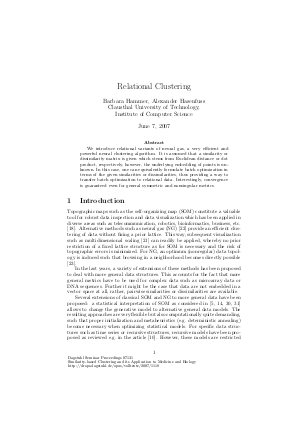Relational Clustering
Authors Barbara Hammer, Alexander Hasenfuss
-
Part of:
Volume:
Dagstuhl Seminar Proceedings, Volume 7131
Part of: Series: Dagstuhl Seminar Proceedings (DagSemProc) - License:
 Creative Commons Attribution 4.0 International license
Creative Commons Attribution 4.0 International license
- Publication Date: 2007-07-16
File

PDF
DagSemProc.07131.6.pdf
- Filesize: 200 kB
- 15 pages
Document Identifiers
Subject Classification
Keywords
- Neural gas
- dissimilarity data
Metrics
- Access Statistics
-
Total Accesses (updated on a weekly basis)
0PDF Downloads0Metadata Views
Abstract
We introduce relational variants of neural gas, a very efficient and powerful neural clustering algorithm. It is assumed that a similarity or dissimilarity matrix is given which stems from Euclidean distance or dot product, respectively, however, the underlying embedding of points is unknown. In this case, one can equivalently formulate batch optimization in terms of the given similarities or dissimilarities, thus providing a way to transfer batch optimization to relational data. Interestingly, convergence is guaranteed even for general symmetric and nonsingular metrics.
Cite As Get BibTex
Barbara Hammer and Alexander Hasenfuss. Relational Clustering. In Similarity-based Clustering and its Application to Medicine and Biology. Dagstuhl Seminar Proceedings, Volume 7131, pp. 1-15, Schloss Dagstuhl – Leibniz-Zentrum für Informatik (2007)
https://doi.org/10.4230/DagSemProc.07131.6
BibTex
@InProceedings{hammer_et_al:DagSemProc.07131.6,
author = {Hammer, Barbara and Hasenfuss, Alexander},
title = {{Relational Clustering}},
booktitle = {Similarity-based Clustering and its Application to Medicine and Biology},
pages = {1--15},
series = {Dagstuhl Seminar Proceedings (DagSemProc)},
ISSN = {1862-4405},
year = {2007},
volume = {7131},
editor = {Michael Biehl and Barbara Hammer and Michel Verleysen and Thomas Villmann},
publisher = {Schloss Dagstuhl -- Leibniz-Zentrum f{\"u}r Informatik},
address = {Dagstuhl, Germany},
URL = {https://drops.dagstuhl.de/entities/document/10.4230/DagSemProc.07131.6},
URN = {urn:nbn:de:0030-drops-11182},
doi = {10.4230/DagSemProc.07131.6},
annote = {Keywords: Neural gas, dissimilarity data}
}
